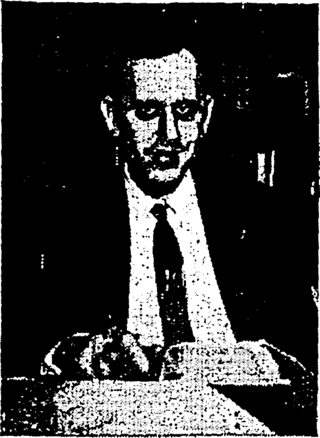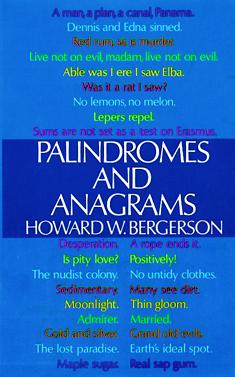
A palindrome is a word, number, phrase, or other sequence of symbols that reads the same backwards as forwards, such as madam or racecar, the date "22/02/2022" and the sentence: "A man, a plan, a canal – Panama". The 19-letter Finnish word saippuakivikauppias, is the longest single-word palindrome in everyday use, while the 12-letter term tattarrattat is the longest in English.
The National Puzzlers' League (NPL) is a nonprofit organization focused on puzzling, primarily in the realm of word play and word games. Founded in 1883, it is the oldest puzzlers' organization in the world. It originally hosted semiannual conventions in February and September of each year, but conventions are now held annually, in July.

Willard Richardson Espy was an American editor, philologist, writer, poet, and local historian. Raised in the seaside village of Oysterville, Washington, Espy later studied at the University of Redlands in California before becoming an editor in New York City, as well as a contributor to Reader's Digest, The New Yorker, Punch, and other publications.
Albert Ross Eckler Jr. was an American logologist, statistician, and author, the son of statistician A. Ross Eckler. He served in the US Army from 1946 – 1947. He received a BA from Swarthmore College with High Honors in 1950 and a PhD in mathematics from Princeton University in 1954.

A word square is a type of acrostic. It consists of a set of words written out in a square grid, such that the same words can be read both horizontally and vertically. The number of words, which is equal to the number of letters in each word, is known as the "order" of the square. For example, this is an order 5 square:
Michael Keith is an American mathematician, software engineer, and author of works of constrained writing.

Dmitri Alfred Borgmann was a German-American author best known for his work in recreational linguistics.

Zzxjoanw is a fictitious entry in an encyclopedia which fooled logologists for many years. It referred to a purported Māori word meaning "drum", "fife", or "conclusion".

"Buffalo buffalo Buffalo buffalo buffalo buffalo Buffalo buffalo" is a grammatically correct sentence in English that is often presented as an example of how homonyms and homophones can be used to create complicated linguistic constructs through lexical ambiguity. It has been discussed in literature in various forms since 1967, when it appeared in Dmitri Borgmann's Beyond Language: Adventures in Word and Thought.
A heterogram is a word, phrase, or sentence in which no letter of the alphabet occurs more than once. The terms isogram and nonpattern word have also been used to mean the same thing.
Logology is the field of recreational linguistics, an activity that encompasses a wide variety of word games and wordplay. The term is analogous to the term "recreational mathematics".

Word Ways: The Journal of Recreational Linguistics is a quarterly magazine on recreational linguistics, logology and word play. It was established by Dmitri Borgmann in 1968 at the behest of Martin Gardner. Howard Bergerson took over as editor-in-chief for 1969, but stepped down when Greenwood Periodicals dropped the publication. A. Ross Eckler Jr., a statistician at Bell Labs, became editor until 2006, when he was succeeded by Jeremiah Farrell.

Howard William Bergerson was an American writer and poet, noted for his mastery of palindromes and other forms of wordplay.
A panalphabetic window is a stretch of text that contains all the letters of the alphabet in order. It is a special type of pangram or pangrammatic window.
James Albert Lindon was an English puzzle enthusiast and poet specialising in light verse, constrained writing, and children's poetry.
A vocabularyclept poem is a poem which is formed by taking the words of an existing poem and rearranging them into a new work of literature.

Palindromes and Anagrams is a 1973 non-fiction book on wordplay by Howard W. Bergerson.
The Puzzle Lovers Club was an American company which ran word game contests by mail.

Beyond Language: Adventures in Word and Thought is a 1967 book written by Dmitri Borgmann.










